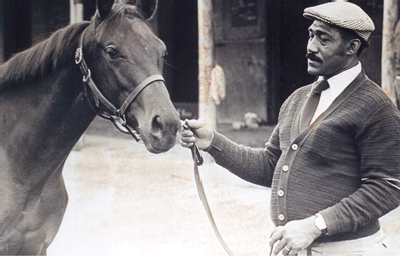Post time for the 143rd running of the Preakness Stakes is 6:20 p.m. on Saturday, May 19, 2018 at Pimlico, where approximately 120,000 people will be in attendance and millions more watching on television around the globe.
The historic race commonly referred to as “The Run for the Black-Eyed Susans,” has a unique place in American horse racing history and Pimlico, it’s home along Park Heights Avenue in Baltimore got its name from a horse who won the stakes more than a century ago. However, often buried in that history is the significant role of African-Americans, particularly jockeys.
“Horse racing is the first American sport and Maryland has a pretty unique role in being one of the first states with tracks and having a competition,” said historian Stuart Hudgins.
Before the first running of the Preakness in 1873, African-Americans dominated the sport, with black jockeys winning the Kentucky Derby, according to Hudgins. Most of the top jockeys were black, he said.
Hudgins recalled that slaves in the south grew up on farms, working in stables, and plantation owners wouldn’t hesitate to put their slaves on their horses’ backs in informal racing in the south.
When racing became an organized sport in the early 19th century, black boys and men were in the vanguard in the saddle, dominating racing until the turn of the century.
However, the landmark 1896 Supreme Court decision in the Plessy v. Ferguson matter changed everything.
That decision upheld the constitutionality of racial segregation after a black train passenger named Homer Plessy refused to sit in a car for African-Americans. The Supreme Court rejected Plessy’s argument that his constitutional rights were violated – a decision that would later be used to strengthen racist Jim Crow laws and separate public accommodations based on race.
“When that happened, there was an extreme fall off in the thousands of contests that African-Americans were able to compete for and eventually they were out of horse racing altogether,” Hudgins said. “We were the original trainers, the grooms, the jockeys. We’ve had such a rich tradition and we had black people who cared for those horses, talked to them— African-Americans were the original horse whisperers,” he said.
Isaac Murphy was the first jockey to win the Kentucky Derby three times, and he was the first black jockey to be inducted in the Thoroughbred racing Hall of Fame in 1955. Oliver Lewis, the winning jockey in the first Kentucky Derby, in 1875, was African-American, one of 13 black jockeys in a 15-horse race that year.
Willie Simms, a 1977 Racing Hall of Fame inductee, won back-to-back Belmont Stakes in 1893 and 1894 and twice won the Kentucky Derby. In 1898, Simms, an African-American reigned at Pimlico, winning the Preakness riding his horse named “Sly Fox.”
Black jockeys won 15 of the first 28 Kentucky Derbies, Hudgins said, referring to a Forbes Magazine article that detailed these accomplishments. But at any racetrack in this country now, you’d have a hard time finding an African-American in the saddle, the article noted.
In the early days of racing in this country, African-American faces were prominent.
On May 10, 1889, George “Spider” Anderson became the first African-American to win the Preakness, which at the time consisted of just two horses at a purse of about $2,000.
Now, 10 horses compete in the Preakness with more than $1.5 million at stake. Hudgins says African-Americans are no longer central to the Preakness or horse racing in general. He recalled what the late African-American tennis great, Arthur Ashe, once said.
“It’s the saddest case,” Ashe said in a 1988 interview when he compared blacks in horse racing in the late 19th century to their modern-day domination in the National Basketball Association.
“Over the years, we as African-Americans got rooted out,” Hudgins said. “When I looked at the tradition of racing, you see we had locally in the Baltimore area townspeople who were heroes and who were acknowledged to be ex
